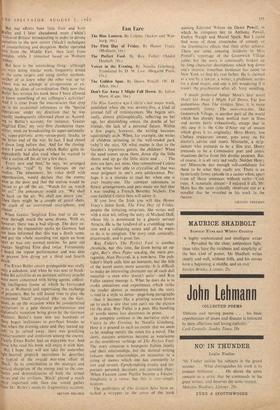Fan Fare
The Blue Lantern was Colette's last major work, published when she was seventy-live, a kind of journal full of reminiscences. She begins seri- ously, almost philosophically, reflecting on her age, her diminishing senses, the deaths of her friends, the lack of a personal future. Within a few pages, however, • the writing becomes squirmingly arch. When, for example, she writes of children urinating • in the well-tended park (why?) she says, 'Of what .matter is that to, the Garden's imperious guests, the children? When the need comes upon them, down slip the little shorts and Up go the little, skirts and . . ."Fhe dots are hers, not mine. One remembered Colette as the writer best able to crystallise all that was most poignant in one's own adolescence. Per- haps it is a, mistake to read her when one is over twenty-One. The constant references to flower arrangements and pets made me feel that I was reading a French Beverley Nichols. I'm sure faithful Colette fans will adore it.
If you love the Irish you will like Honor Tracy's latest book, The First Day of Friday, despite the irritating misprints. She writes well with a nice wit, telling the story of Michael Duff, whose life is dominated by a ghastly servant Atracta. He is the landlord of a crumbling man- sion and a collapsing estate and all he wants to do is to emigrate. The story ends comically, disastrously, and is great fun.
Roy Fuller's The Perfect Fool is another chronicle, but this time, far from being an up- right, Boy's Own Paper sea-dog, the main pro- tagonist, Alan Percival, is a non-hero. The pub- lisher's blurb calls him an innocent, but the title of the novel seems more accurate. It is difficult to make an interesting character out of such dull material—a man who 'doesn't quite'- and Roy Fuller. cannot manage it. What he does do is to evoke sensations and experiences which strike the reader almost as memories; but the story is told in a style so dense—page-long paragraphs that it becomes like a printing screen blown up to such a size that you can't see the picture for the dots. Roy Fuller is a poet. His handling of words seems less dexterous in prose.
In complete contrast is the narrative style of Voices in du, Evening, by Natalia Ginzburg. Here it is pruned to such an extent that we seem to be reading merely the notes for a novel. The short, staccato sentences become as wearisome as the overblown verbiage of The Perfect Fool. The story concerns a bourgeois Italian family and their relationships, but the skeletal writing reduces these relationships on occasions to a string of names which one has constantly to Sort and re-sort. Epoch-making events and im- portant personal decisions arc recorded thus: 'When Fascism came Purillo became a Fascist.' Simplicity is a virtue, but this is over-simpli- ['cation.
The publishers of The Golden Spur have at- tached a wrapper to the cover of the book quoting Edmund 'Wilson on Dawn Powell, in which he compares her to Anthony Powell, Evelyn Waugh and Muriel Spark.. But I could find none of those crescendos of comedy or the illuminative effects that their styles achieve. There are some amusing incidents in Miss Powell's reportage of the Greenwich Village scene, but the story is continually broken up by long character descriptions which bog down one's interest. Jonathan Jamieson has cork to' New York to lind his real father. He is claimed as a son by a lawyer, a writer, a professor; settles for a dead major, and one is left wondering if it wasn't the psychiatrist after all. Very middling.
I much preferred Julian Mores first novel Don't Go Away / Might Fall Down. Far less pretentious than The Golden Spur, it is more consistently funny. The wise-en-scene, like Greemvich Village. is another part of the world which has already been worked over in films and novels fairly exhaustively, except that in this case it is the COte d'Azur out of season which gives it its originality. Hero Henry, late Chelsea restaurant owner, goes away on his doctor's advice and meets Minouche, a strip- dancer who pretends to be a film star. Henry pretends to be a Communist poet and comic situations derive from this double pretence. But, of course, it is all very sad really: Neither Henry nor Minouche has enough self-confidence for them to be what they really are. There is an hysterically funny episode in .a casino when, apart from all those sentences without verbs—'Cork trees. A mountain stream'- • -I enjoyed it all. Mr. More has the same cynically observant eye as a ,novelist that he revealed in his work in the theatre.
GiLLI \ I RI I-M






























 Previous page
Previous page